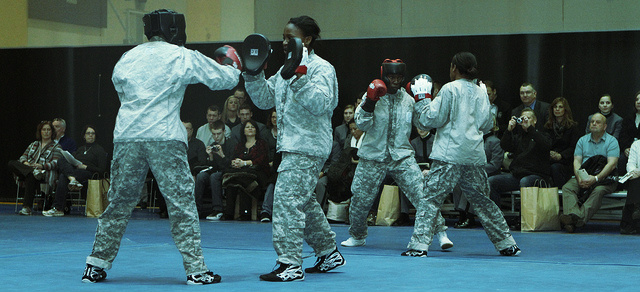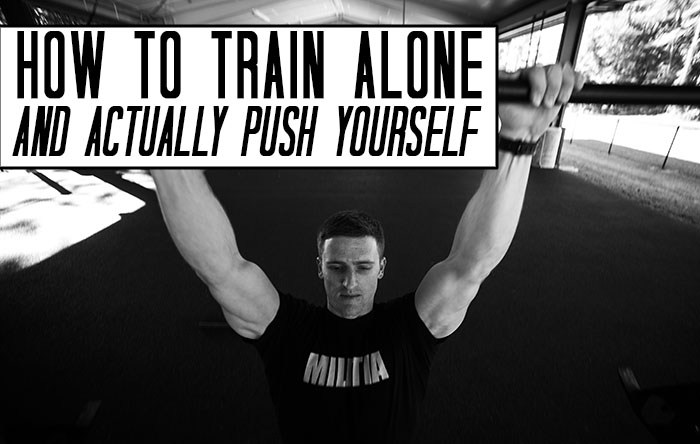If you are an individual who has trouble working out alone, if you don’t have mental toughness in sports, this article is for you. If you have trouble, even with the aid of a partner, to fulfill a commitment to yourself … this article is for you.
You see, there are levels of effort when it comes to pushing yourself. One could argue that there are even negative levels, where you have less than zero motivation.

That’s where mental toughness in sports comes in. That’s where you need strategies and tactics that can push you over the fence. When you’ve run around the high-school track almost 4 times on your way to the mile (for example) and you find yourself slowing down. You’re out of breath. Your side is aching. The spit is thick in your mouth. You have sweat pouring down your forehead. You feel like you could double over and puke any second, and you have no idea when you’ll get a second wind.
And there is no one to cheer you on.
That’s when you need a bit of mental toughness in sports.
Ok, so maybe you’ve progressed well beyond that one-mile mark, but some of us can still remember the embarrassment of not even being able to run a mile. (That was after being certain that running just one mile was no problem. So on a bet … uh … it was humiliation time.)
Coulda used some mental toughness to push through and reach that finish line no matter what.
With you in mind, and not wishing embarrassment or humiliation (private or public) upon any of you … let’s start off with a great TEDx speech by Dr. Sean Richardson on the subject of mental toughness in sports.
Mental Toughness: Think Differently about Your World
7 Ways to Train Alone (And Actually Push Yourself)
“To train alone is to develop a skill or an art, and it is not simple.
Anybody can walk around the block or go through the motions of a workout alone…
I’m sure you’ve heard the popular quote, “80% of success is showing up”…
But JUST showing up is not enough.
It builds a habit but doesn’t yield the greatest return.
Do you know how to push yourself when training alone?
I can tell you this. It’s not as easy as saying, “Push yourself!”, and magical workout leprechauns and unicorns get you through it…
No.
But you can put pushing yourself on autopilot with a few simple techniques.
Today, I am going to give you seven techniques you can use to push yourself. Put them in place and you will see the results you want when you train alone.
Like I said, showing up is not enough and you won’t get any gold stars from me for JUST completing a workout.
You read that right.
Maybe you feel good breaking a light sweat and burning a few calories, but I call that being a human being. If you want to be better you need to learn to push yourself without a cheerleader, without your favorite music, and without a reward.
Alright, do I have your attention?

I estimate that I have worked out in my garage ALONE well over 1,000 times in the last 5 years.
And I won’t negate having a training partner; they help TONS and I recommend having a partner if you can, but when you can’t here’s what you do…
#1: Set Meter Goals (once per week)
I love interval training.
I think it is one of the best and most effective ways to improve your conditioning.
There is just one problem…
I’ve tested this as a coach. If I give an athlete many intervals of 30 seconds of work followed by 30 seconds of rest (with no further instruction), the final interval is WAYYYYY off from the first.
People tend to go out too hard and lose focus over time. Unless they have a goal, but what should it be?
Here’s what you do when planning a 30:30 interval which will have many rounds:
Take your goal (not actual, but goal) mile time – say it is 6 minutes flat.
6 min = 360 seconds
Mile = 1600m
m/s = 4.44
4.44 x 30 sec would set your minimum distance @ 133m per 30 seconds of work.
If it’s too easy you aren’t doing enough intervals. You can also base it off of your 400m or 800m sprint speeds…It all depends on what you are trying to improve. You can do this all the way up to 5K race pace with longer work/rest intervals.
It works with rowing, Airdyne, Biking, etc.
Do this once a week and stick to your meter goal.
If you don’t meet your goal you will apply penalties, which we will talk about in a minute.
Next, we talk about the true motivator…MONEY!”
To read Jerred’s full article, just click the title or the image immediately beneath it!
Now, we have one more article on mental toughness in sports and pushing yourself through hard workouts. This next one is by Brittany Risher, and it was first published over at Tony Horton’s beachbodyondemand.
How to Improve Your Mental Strength to Push Through a Hard Workout
“In the middle of a HIIT workout, when your shirt is soaked through with sweat and you’re about to start yet another round of burpees, it’s not uncommon to think, “I can’t do this. I can’t even do one more rep.” But what’s sending that message – your body or your brain? Are your muscles truly getting tired, or is it just your mental strength that’s waning?
While it’s always important to listen to your body and never push yourself to the point of injury, sometimes your brain can prevent your body from doing all that it can. When it comes to performing feats of athleticism – whether that’s competing in an IRONMAN or trying to hold a plank just a little bit longer – mental toughness plays a huge role in what you can accomplish. Luckily anyone can develop mental strength. Just like training for a race or learning to do pull-ups, it’s something that takes time to master. The more you practice it, the more benefits you’ll see.
Why Being Mentally Tough Matters
Outside the weight room, mental strength helps you get through the ups and downs of life, like criticism at work or dealing with a break up.
When it comes to fitness, being mentally strong and having grit means you can crush your training, even when you want to give up. Endurance athletes, like those who compete in IRONMAN races, especially benefit from being mentally strong.
In order to succeed, such athletes have to become experts at not only enduring physical unpleasantness, but overcoming it, too. That’s why we interviewed a handful of the best triathletes in the world in addition to exercise psychologists to learn their secrets on improving mental strength and pass them on to you.
“[Endurance athletes] need intrinsic motivation to succeed, as these sports require lengthy periods of focusing and managing physical discomfort,” explains Jennifer Carter, Ph.D., a counseling and sport psychologist at Ohio State Wexner Medical Center. You might not be training for a triathlon anytime soon, but mental strength can help you get through a hard workout and achieve your goals faster.”
To read Brittany’s full article, just click the title above or the image directly beneath.
Finally gang, we’re going to round everything out with a workout for mental toughness in sports. 🙂 Check it below.
Mental Toughness in Sports
If you feel like you’ve found some value here, go share this article on Facebook or Pinterest.
Until next time!
(We’re gonna go run that mile now.)



